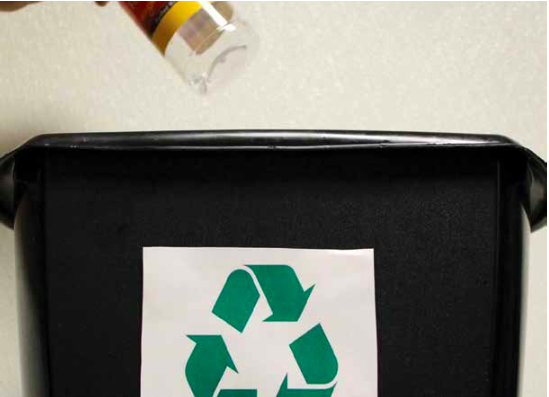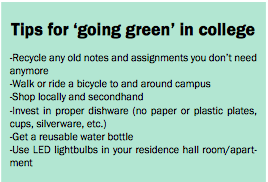
Ferris students are discovering more opportunities to recycle on campus and learning new ways to improve environmental sustainability.
Ferris debuted a new recycling program in 2018 which placed recycling containers inside each residence hall room, encouraging students to recycle. Since then, the amount of recyclable materials collected on campus has doubled. Additionally, nearly 50 water bottle refill stations have been installed throughout campus since 2016 to reduce plastic waste.
Along with the new recycling program and water bottle refill stations, Ferris’ Environmental Sustainability Task Force (EST) has made efforts to ensure Ferris and its community is dedicated to environmentally-friendly living. The EST ensures that every new building constructed on campus is certified by the Leadership in Energy and Environmental Design (LEED) program and receives an LEED Silver rating. Ferris’ University Center and the Michigan School of Optometry are some of the LEED Silver rated buildings on campus, indicating these buildings use more sustainable materials and less energy.
“The focus of the task force for this year, and perhaps in the next couple [years], will be more on impacting and influencing the campus community’s behavior in a positive way towards their individual role in sustainability,” Ferris Physical Plant Vice President Michael Hughes said.
Students are exercising some new eco-friendly practices as well. The Bulldog Sustainability Alliance (BSA) is a Ferris student organization dedicated to environmental sustainability education and actions both on and off campus.
“I really like how Ferris is focusing on building new buildings and getting rid of the old things. They’ve been doing really well in that aspect, renovating old buildings and building new buildings in a sustainable manner,” Ferris environmental biology senior and BSA President Amber Hubbard said. “Now that we have campus-wide recycling, I think it’s nice that everyone now has access to recycling rather than it just being dumpsters around campus. It’s more of an incentive to recycle.”
However, Hubbard believes there are several areas where Ferris and its community can improve their eco-friendly tactics.
“I think education on recycling is important,” Hubbard said, “I’ve run across kids throwing away things that can be recycled, I’ve run across them recycling things that aren’t recyclable at all and it’s a big issue honestly. If people don’t recycle properly, that’s just more trash.”
“There’s a lot of things that people don’t know that they can easily do,” Ferris psychology senior and BSA member Dani Jandura said. “They’re taking baby steps to get people there, but I think they have to backtrack to get people there and first educate people about things that are going wrong.”
Other Michigan universities have established sustainability practices on their campuses as well. The Office of Sustainability Practices at Grand Valley State University educates its students and staff on methods of waste reduction and energy conservation. In addition to sustainability-related education programs and scholarships, the Office of Sustainability Practices hosts events such as the Farmers Market and operates Green-Ride, a university carpooling program.
In 2008, Central Michigan University established their Campus Sustainability Advisory Committee. According to an article published by CMU News in January 2017, the initiatives started by the committee have saved the university “nearly 11 million dollars.”
Although Ferris is working to improve sustainability on campus, students can make some small changes to their routine to help the environment.
“In my house, my roommates and I recycle pretty much anything we can,” Jandura said. “I try my best to use reusable cups when I go to Starbucks, I always bring my own cup. I don’t use single-use plastics at home, I use things like Tupperware instead of stuff like single use baggies.”

